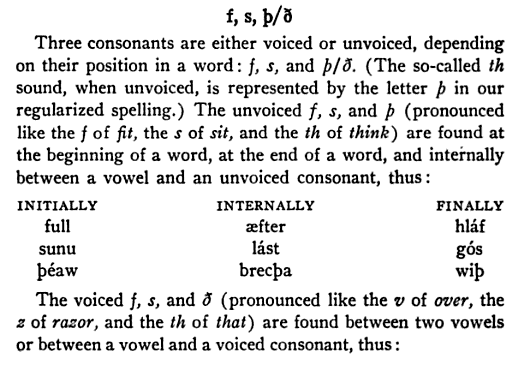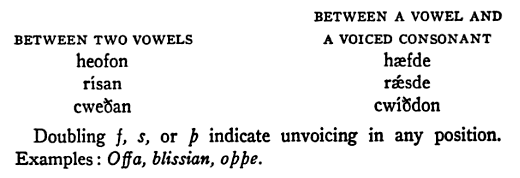I was wondering about adding an e at the end of a word to change it from a noun to a verb. For example, cloth to clothe, and breath to breathe. Is this some special rule, or a quirk to the English Language?
-
1There is no ‘rule’. These are vestiges of a former former system of inflection that was lost over the history and prehistory of the English language. It is not a productive suffix, just a few random remnants here and there. You can’t take a noun such as ‘path’ and create a verb ‘pathe’ from it, for example. It is only possible with a few monosyllabic nouns that end in /θ/ (cloth, breath, bath … can’t think of any others off the top of my head), by turning it into an /ð/ instead.– Janus Bahs JacquetCommented Nov 17, 2013 at 20:34
-
@JanusBahsJacquet But you could make 'path' into 'pave'. Are they connected?– WS2Commented Nov 17, 2013 at 21:14
-
3Grief / grieve, thief / thieve; also mouth and house, where there is no change in spelling, and sooth / soothe, where now the noun and the verb are quite separate, but originally they were another pair like this. @NickelMonster, it is not "adding an e", it is voicing the final (fricative) consonant.– Colin FineCommented Nov 17, 2013 at 21:14
-
1Back when verbs had syllabic endings in all forms, the alternation arose quite regularly as fricatives were voiced intervocally, but devoiced word-finally. The vowel alternation seems to be partly from cases where the noun and the verb are built on different ablaut grades, and partly from the Great Vowel Shift wreaking havoc on the poor, unsuspecting English language and randomly lengthening and shortening vowels here and there. Life/(a)live vs. to live is a case of the former; cloth vs. clothe of the latter.– Janus Bahs JacquetCommented Nov 17, 2013 at 21:41
-
1Another interesting example is safe / save, as it is an adjective/verb pair (on the assumption that safe as a noun is a comparatively recent invention). Some more noun/verb pairs: grass / graze, glass / glaze.– Daniel HarbourCommented Nov 17, 2013 at 22:12
1 Answer
(The key elements of the answer to this question are given in the comments following it. This answer ties them together and adds some more detail.)
If you look at a fuller range of examples—
calf, calve; grief, grieve; half, halve; life, live; proof, prove; safe, save; serf, serve; strife, strive (with some meaning drift); thief, thieve;
advice, advise; clo[s]e, clo[z]e; glass, glaze; grass, graze; hou[s]e, hou[z]e; u[s]e, u[z]e;
bath, bathe; breath, breathe; cloth, clothe; mouth[θ], mouth[ð]; sheath, sheathe; tooth, teethe (still retaining old ablaut); wreath, wreathe;
—then you notice several key points:
- All examples end in -f, -[s], -th, not in any other consonants.
- These consonants are always preceded by vowels, or, more rarely, by liquids (half, halve; serf, serve).
- The voiced (-[v], -[z], -[ð]) counterparts are always found in verbs (whereas the unvoiced counterparts can be either nouns or adjectives, like close and safe).
The voicing alternation (like the vowel alternation of tooth, teeth(e)) is fossilized phonology of Anglo-Saxon. Robert Diamond’s grammar of the language gives part of the processes, clearly identifying the Anglo-Saxon fricatives (f, s, þ) as voicing between vowels:


He does not say (though from memory Henry Sweet does) that these sounds also voice in the context vowel-l/r-...-vowel.
Verb formation from nouns and adjectives created the intervocalic context in Anglo-Saxon, because the verbal suffixes were nearly all verb initial (e.g., infinitival -(i)an, first singular present -e, third plural present -on). (Moreover, the past tense -d- also created a context for voicing, as per Diamond’s cited passage.)
Together, these explain the three generalizations governing examples like the ones that the questioner gave:
- As Diamond’s discussion implies, these are the only three sounds of Anglo-Saxon that voice intervocalically, -f, -s, -th, which is why all examples end in orthographic variants of these consonants. (E.g., there’s no pinch, pinge.)
- The rule of voicing operated only in special circumstances (e.g., vowel-...-vowel, vowel-l/r-...-vowel). (E.g., there’s no rinse, rin[z]e.)
- Voicing occurs in verbs as, in Anglo-Saxon, verb formation triggered voicing owing to the shape of the suffixes. (Nouns and adjectives could occur without suffixes.)
Time has gnawed away at the rich morphology of Anglo-Saxon, so that the verb endings are now gone. Nonetheless, their effect is still felt in a few examples that speakers simply have to memorize.
-
+1! A very good and thorough answer. One thing to note is that the voicing described here is similar to, but different from, the voicing that came about as a result of Vernerian alternation in an earlier stage of the language. The result of Vernerian [s] > [z] show up in Old English as an s/r alternation, since inherited [z] became [r] in West Germanic. In the other cases, though, the results would be the same and quite hard to tell apart. Commented Nov 17, 2013 at 23:56
